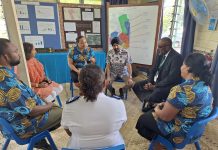Fiji is grappling with a methamphetamine crisis that has infiltrated every part of society, from villages, schools, and the police sworn to protect them.
Ilisapeci Veibuli from the Fiji Womens Crisis Centre has watched the rapidly spiralling meth use with alarm and says it’s so extensive it’s been normalised.
“People are actually doing it out in public. They are not scared of the law, I never thought it would be as worse as it is now,” she said.
“I feel it’s every household because most of our communities we are living in the extended family, it’s happening in the villages, it’s happening in the schools, children are using it, students are using it.”
Pio Tikoduadua is the Home Affairs Minister responsible for the military and police.
He admits meth is now not isolated to just certain cities and urban areas – it’s everywhere.
“Not only is it killing the youth, it’s killing our children too. If we do not solve this drug problem in Fiji soon, our nation is going to be a nation of zombies,” he said.
Tikoduadua said children are being used as mules to sell drugs to their friends outside school.
“I know, and I have heard also, which is even worse, that some parents have actually given drugs to their children to sell in school.”
Earlier this year, nearly five tonnes of meth was found in two houses in Nadi sourced from Mexico.
Transnational crime specialist Jose Sousa-Santos said there was enough meth there to feed the Australian market for a year, and it would have been drip-fed into New Zealand and Australia so as not to flood the market and drive the price down.
Sousa-Santos says the fact the Nadi meth stash had no guards and wasn’t in safehouses “is a very, very big red flag” because transnational criminal syndicates only do that when they feel comfortable and secure.
Neighbours around the drug houses didn’t want to speak to us on camera because after they were interviewed by local media, a group of men turned up in a car trying to intimidate them, and threats were made.
Sousa-Santos, who has just returned from Fiji, says in the past, there were political and commercial elites who helped facilitate the drugs through the country, but now the syndicates have created a local market which guarantees them more help.
“You also have larger access to law enforcement, members of parliament to the commercial elites as they have this larger reach creating this larger pool of users..you then understand why it is spreading so fast”.
1News interviewed a man we will call Vili – a drug user and supplier who’s done jail time in Fiji.
He was closely associated with the Rahmans – Tallet Rahman, now in a New Zealand prison for importing meth from Mexico for the Comancheros. Son Joshua is serving 20 years behind bars in Suva for possession of nearly forty kilos of cocaine.
Vili said he influenced a lot of people to use meth.
“They bring the yachts from Tonga to Onoilau and Matuku, which is in the Lau group. They seal wrap it so it’s waterproof, and they put nets and buoys and GPS and put it in the sea to be picked up,” he said.
Those on the street say buying meth is as easy as buying a curry – it just costs more.
“A quarter bag is FJD$150 (US$75), and a half bag is FJ$250-300 (US$125 – US$150), but as I am saying, it depends on the grading. That’s what people in Fiji are doing, so they can consume, consume, consume and sell a few, so they can get a reload,” Vili said.
People are selling everything they own, stealing from family and friends, and there’s increasing violence.
Ilisapeci Veibuli looks weary – there are no rehabilitation programmes in Fiji, and the Women’s Crisis Centre is overwhelmed with the need.
“The way it is, the future of Fiji is bleak,” she said.
There’s a lot on the line for Fiji’s next generation.














